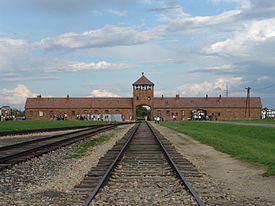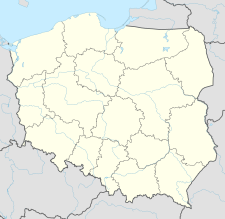Auschwitz-Birkenau concentration camp
| Auschwitz | |
|---|---|
| German Nazi concentration and extermination camp (1940–45) | |

The main entrance to Auschwitz II (Birkenau)
|
|
| Coordinates | 50°02′09″N 19°10′42″E / 50.03583°N 19.17833°ECoordinates: 50°02′09″N 19°10′42″E / 50.03583°N 19.17833°E |
| Other names | Birkenau |
| Location | Auschwitz, Nazi Germany |
| Operated by | The Nazi Schutzstaffel (SS), the Soviet NKVD (after World War II) |
| Commandant |
|
| Original use | Army barracks |
| Operational | May 1940 – January 1945 |
| Inmates | Mainly Jews, Poles, Romani, Soviet prisoners of war |
| Killed | 1.1 million (estimated) |
| Liberated by | Soviet Union, January 27, 1945 |
| Notable inmates | Adolf Burger, Anne Frank, Otto Frank, Viktor Frankl, Imre Kertész, Maximilian Kolbe, Primo Levi, Irène Némirovsky, Witold Pilecki, Edith Stein, Simone Veil, Rudolf Vrba, Elie Wiesel, Fritz Löhner-Beda, Else Ury |
| Notable books | If This Is a Man, Night, Man's Search for Meaning |
| Website | Auschwitz-Birkenau State Museum |
| Official name | Auschwitz Birkenau, German Nazi Concentration and Extermination Camp (1940–1945) |
| Type | Cultural |
| Criteria | vi |
| Designated | 1979 (3rd session) |
| Reference no. | 31 |
| Region | Europe and North America |
Auschwitz concentration camp (German: Konzentrationslager Auschwitz, also KZ Auschwitz [kɔntsɛntʁaˈtsi̯oːnsˌlaːɡɐ ˈʔaʊʃvɪts]) was a network of German Nazi concentration camps and extermination camps built and operated by the Third Reich in Polish areas annexed by Nazi Germany during World War II. It consisted of Auschwitz I (the original camp), Auschwitz II–Birkenau (a combination concentration/extermination camp), Auschwitz III–Monowitz (a labor camp to staff an IG Farben factory), and 45 satellite camps.
Auschwitz I was first constructed to hold Polish political prisoners, who began to arrive in May 1940. The first extermination of prisoners took place in September 1941, and Auschwitz II–Birkenau went on to become a major site of the Nazi Final Solution to the Jewish Question. From early 1942 until late 1944, transport trains delivered Jews to the camp's gas chambers from all over German-occupied Europe, where they were killed with the pesticide Zyklon B. An estimated 1.3 million people were sent to the camp, of whom at least 1.1 million died. Around 90 percent of those killed were Jewish; approximately 1 in 6 Jews killed in the Holocaust died at the camp. Others deported to Auschwitz included 150,000 Poles, 23,000 Romani and Sinti, 15,000 Soviet prisoners of war, 400 Jehovah's Witnesses, and tens of thousands of others of diverse nationalities, including an unknown number of homosexuals. Many of those not killed in the gas chambers died of starvation, forced labor, infectious diseases, individual executions, and medical experiments.
...
Wikipedia

